
The bass guitar, electric bass or simply bass is the lowest-pitched member of the guitar family. It is a plucked string instrument similar in appearance and construction to an electric or acoustic guitar, but with a longer neck and scale length. The bass guitar most commonly has four strings, though five- and six-stringed models are also relatively popular, and bass guitars with even more strings or courses have been built. Since the mid-1950s, the bass guitar has largely come to replace the double bass in popular music due to its lighter weight, the inclusion of frets in most models, and, most importantly, its design for electric amplification. This is also because the double bass is acoustically compromised for its range in that it is scaled down from the optimal size that would be appropriate for those low notes.
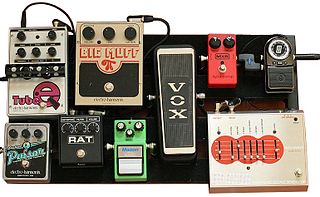
An effects unit, effects processor, or effects pedal is an electronic device that alters the sound of a musical instrument or other audio source through audio signal processing.

The guitar is a stringed musical instrument that is usually fretted and typically has six or twelve strings. It is usually held flat against the player's body and played by strumming or plucking the strings with the dominant hand, while simultaneously pressing selected strings against frets with the fingers of the opposite hand. A guitar pick may also be used to strike the strings. The sound of the guitar is projected either acoustically, by means of a resonant hollow chamber on the guitar, or amplified by an electronic pickup and an amplifier.

Jazz guitar may refer to either a type of electric guitar or a guitar playing style in jazz, using electric amplification to increase the volume of acoustic guitars.

Vox is a British musical equipment manufacturer founded in 1957 by Thomas Walter Jennings in Dartford, Kent, England. The company is most famous for making the Vox AC30 guitar amplifier, used by The Beatles, The Rolling Stones, The Kinks, The Yardbirds, Queen, Dire Straits, U2, and Radiohead; the Vox Continental electric organ, the Vox wah-wah pedal used by Jimi Hendrix, and a series of innovative electric guitars and bass guitars. Since 1992, Vox has been owned by the Japanese electronics firm Korg.

Lightning Bolt is an American noise rock duo from Providence, Rhode Island, composed of Brian Chippendale on drums and vocals and Brian Gibson on bass guitar. The band met and formed in 1994 as students of the Rhode Island School of Design. Lightning Bolt were listed 8th in Metacritic's Artists of the Decade 2000–09.
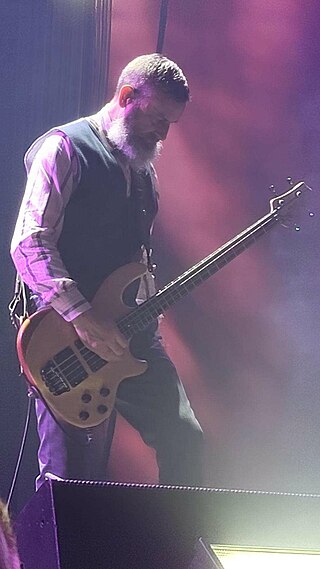
Justin Gunnar Walter Chancellor is an English musician, best known as the bassist for rock band Tool, a position he has held since 1995. Prior to joining Tool, he played in a band called Peach. After settling in the US, along with his engagement in his musical projects, he and his wife Shelee Dykman Chancellor ran a store called Lobal Orning in Topanga, California, dedicated to music and literature "that shaped and changed" both of them. The store closed in 2008. He started M.T.Void music project with Piotr "Glaca" Mohammed from Sweet Noise.

Christopher A. Chaney is an American musician. He is best known as the former bass guitarist of the alternative rock band Jane's Addiction, with whom he recorded two studio albums, and as a member of Alanis Morissette's touring and recording band for six years. He has previously been a member of Taylor Hawkins and the Coattail Riders and Camp Freddy. In 2024, Chaney was announced as the touring bass guitarist for AC/DC, replacing longstanding member Cliff Williams on the band's Power Up Tour.
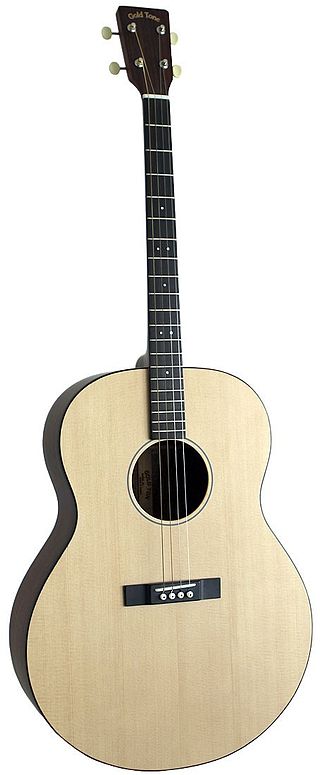
The tenor guitar or four-string guitar is a slightly smaller, four-string relative of the steel-string acoustic guitar or electric guitar. The instrument was initially developed in its acoustic form by Gibson and C.F. Martin so that players of the four-string tenor banjo could double on guitar.
Chorus is an audio effect that occurs when individual sounds with approximately the same time, and very similar pitches, converge. While similar sounds coming from multiple sources can occur naturally, as in the case of a choir or string orchestra, it can also be simulated using an electronic effects unit or signal processing device.
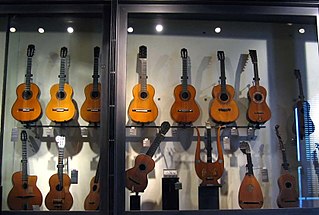
The following outline is provided as an overview of and topical guide to guitars:

Colin Edwin Balch is an Australian musician, specialising in fretted and fretless bass guitar, double bass and guimbri.

Peter Hayes is an American musician and singer, best known as a member of the rock band Black Rebel Motorcycle Club.

A bass amplifier is a musical instrument electronic device that uses electrical power to make lower-pitched instruments such as the bass guitar or double bass loud enough to be heard by the performers and audience. Bass amps typically consist of a preamplifier, tone controls, a power amplifier and one or more loudspeakers ("drivers") in a cabinet.

A guitar controller is a video game controller designed to simulate the playing of the guitar, a string musical instrument. Guitar controllers are often used for music games such as Guitar Hero, Rock Band, Um Jammer Lammy: NOW! and GuitarFreaks. The controllers are played by holding down a colored fret button that matches a colored, on-screen note, while pressing the strum bar as the note passes through the target. The controllers also feature a whammy bar, which is used to bend notes and collect each game's equivalent of bonus energy. Different games and models of controllers have introduced additional features, such as effects switches, additional fret buttons, and fret touch pads. The fret buttons are colored usually in the order of green, red, yellow, blue, and orange.
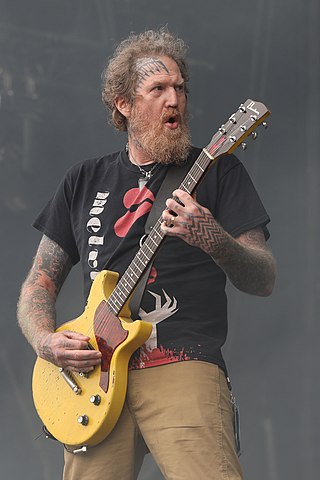
William Brent Hinds is an American musician best known as the lead guitarist of the Atlanta, Georgia metal band Mastodon, in which he shares guitar duties with Bill Kelliher and vocal duties with Troy Sanders and Brann Dailor.
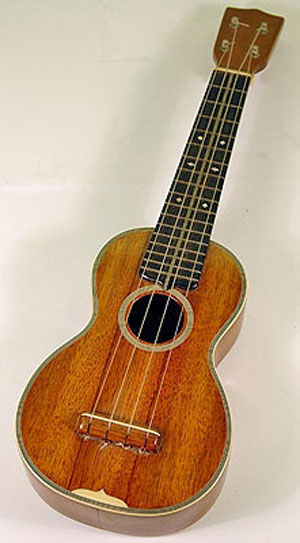
On a stringed instrument, a break in an otherwise ascending order of string pitches is known as a re-entry. A re-entrant tuning, therefore, is a tuning which does not order all the strings from the lowest pitch to the highest pitch.

Michael McKeegan is a Northern Irish musician best known as the bassist of rock band Therapy?.
Gretchen were an American female-fronted alternative rock band from Bristol, Tennessee, United States, featuring heavy guitar tones and emotional, ethereal melodies led by husband and wife team of Dave and Mia Richards. Mia took on bassist duties after the Mouth Full of Nails album, due to the difficulty of keeping a regular bass player.

Heavy metal bass is the use of the bass guitar in the rock music genres of heavy metal and hard rock. The bassist is part of the rhythm section in a heavy metal band, along with the drummer, rhythm guitarist and, in some bands, a keyboard player. The prominent role of the bass is key to the metal sound, and the interplay of bass and distorted electric guitar is a central element of metal. The bass guitar provides the low-end sound crucial to making the music "heavy". The bass plays a crucial role in heavy metal and a more important role than in traditional rock."


















